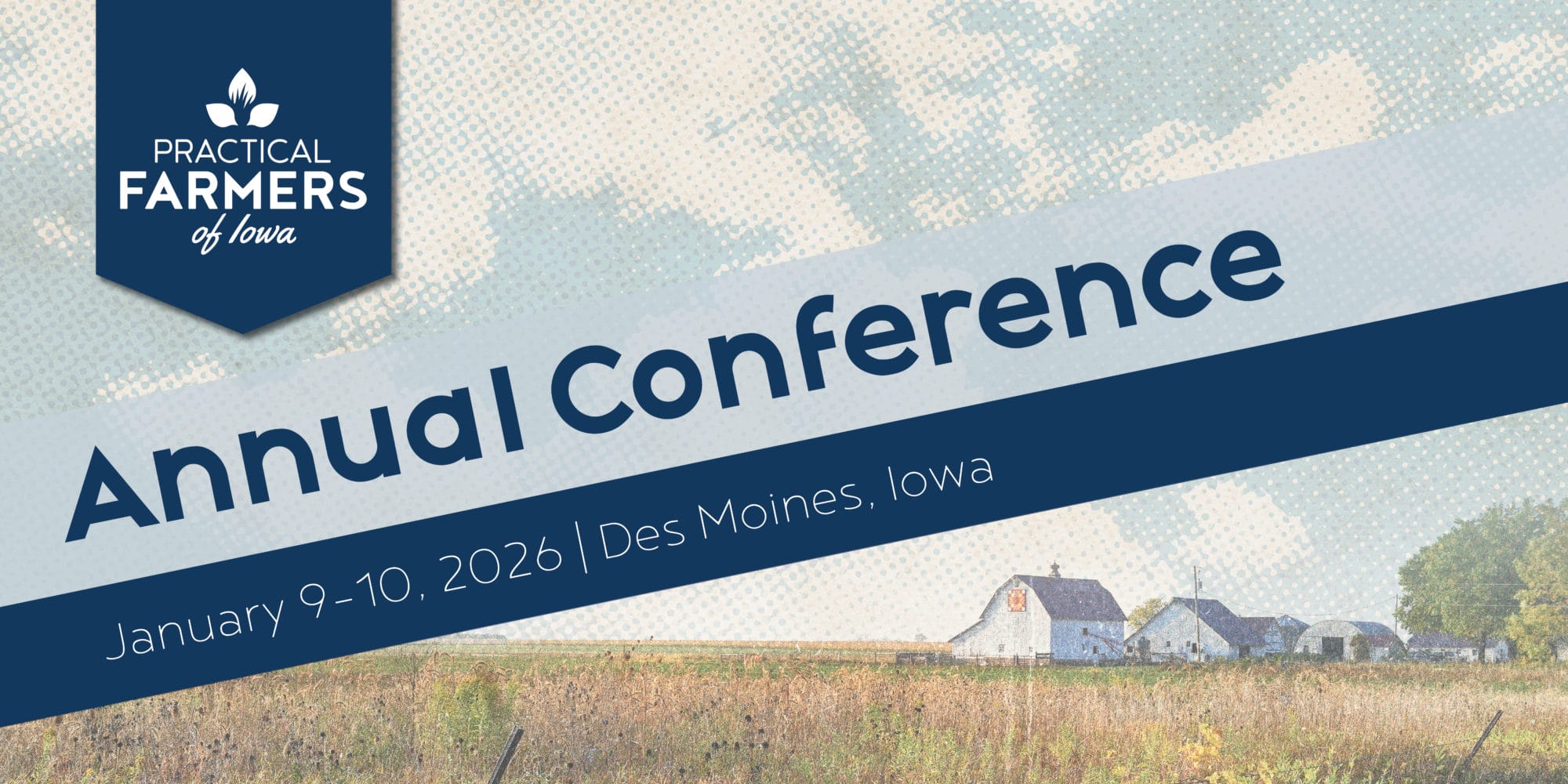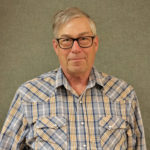Short Courses
Thursday, Jan. 8 | 10 a.m.-5:15 p.m.
Ahead of the official conference festivities, we are pleased to offer four “short courses.” Short courses are in-depth explorations of a specific topic that our members have expressed interest in learning more about. Running only on Thursday this year, a short course is a unique opportunity to expand your conference learning experience and gain more detailed knowledge about topics that interest you.
Registration will open at 9 a.m.; sessions will begin at 10 a.m.
New this year: Thursday lunch is now included with every short course registration.
Lunch: 12:30-1:30 p.m. | Roasted Turkey Sandwich, BLT Pasta Salad, Chips and a Cookie
Because space is often limited for short courses, pre-registration is strongly encouraged, and short course attendance is charged per person.
Short Course Pricing:
****Preregistration for short courses has closed. Onsite registration will be available at the walk-in rates noted in the table below.
| Preregistration Rates (Closes Dec. 23) | Walk-in Rates (On-site Registration) | |
| PFI Member | $70/person | $100/person |
| Non-Member | $145/person | $175/person |
Short Courses:
Short Course 1: Wholesale-Ready: Preparing Your Farm and Evaluating Opportunities
Short Course 2: Field Crops Research Highlights
Short Course 3: Poultry Pathways: The Business of Raising Birds for Meat and Eggs
Short Course 4: Farm Transition: Taxes and Estate Planning
Short Course 1: Wholesale-Ready: Preparing Your Farm and Evaluating Opportunities
Purchasing programs like the Local Food Purchasing Assistance Program (LFPA) and Local Food for Schools (LFS) helped many fruit and vegetable growers get a foot in the door with wholesale buyers. Funding for both programs ended in 2025 and farmers face a new challenge: how to sustain and grow those wholesale relationships through stronger planning and infrastructure.
In this full-day short course, farmers will:
- Explore what scale and markets are the right fit for your farm.
- Hear from wholesale buyers about their purchasing process and expectations.
- Learn from farmers who have successfully navigated wholesale markets.
- Get practical tools to strengthen your crop planning process and align with production sales and outlets.
Sessions
Session 1: How Wholesale Works for Your Farm
Speaker: Ariel Pressman
Wholesale markets aren’t one-size-fits-all. Rather, they look different for every farm. In this session, Ariel Pressman will introduce types of wholesale markets and explain how farms of different sizes can participate. He’ll outline what buyers expect, what trade-offs exist compared to direct markets and what kinds of adjustments in infrastructure, labor and planning make wholesale work. Farmers will leave with a clear framework for understanding where their farm might fit and how wholesale sales could complement existing outlets.
Session 2: Getting Your Farm Ready for Wholesale
Speaker: Ariel Pressman
Once you know the types of markets you might want to pursue, how do you prepare your farm to meet their needs? This session digs into the nuts and bolts of wholesale readiness: planning for consistent supply, aligning planting and harvest schedules with buyer timelines and setting up postharvest systems for quality and food safety. Ariel will also cover the relationships side of wholesale, including how to communicate with buyers, set expectations and deliver reliably. Farmers will leave with practical next steps to strengthen their crop planning and logistics for wholesale sales.
Session 3: Panel: Market Opportunities With Schools and Institutions
Speakers: Lisa Stewart, Nancy Eastman
Discover how school buyers operate and what it takes to sell your produce successfully into these markets. In this session, school nutrition directors will walk you through their procurement processes, including order cycles, menu planning and product specifications. You’ll learn how to align your planting and harvest schedules with buyer calendars, navigate compliance and food safety requirements, and package and deliver products to meet institutional standards. This session gives you an inside look at what schools and institutions need, which in turn will help you plan and communicate your crop production to open new, reliable markets for your farm.
Session 4: How Food Hubs Can Help You Scale Up
Speakers: Giselle Bruskewitz, Michelle Dill, Stefanie Jaeger
Learn how tapping into the network of Iowa food hubs could open up new market opportunities, streamline logistics and make scaling your farm’s sales more manageable. Building on examples like the Northwest Food Hub Network and emerging collaboration among Iowa hubs, we’ll explore what happens when hubs coordinate across regions – and what that means for farmers. We’ll cover the infrastructure (including technology) that makes it work, the potential market impact and practical ways farmers can plug into a hub network. Hear from hub leaders on how collaboration can reduce duplication, expand reach and create shared value for farms of all sizes.
Session 5: Farmer System Share: Planning Tools in Action
Speakers: Matthew Kroul, Carly Zierke
See how farmers manage crop planning at scale! Experienced growers will share the systems they use – from paper planners and spreadsheets to software – to organize plantings, track harvests and coordinate deliveries. You’ll hear the pros and cons of their approach, lessons learned as they scaled up and recommended resources. The session will leave time for you to ask questions, compare strategies and get planning templates to adapt for your own farm. Come gain peer-tested ideas for making your crop planning more efficient, accurate and market-ready!
Meet the Speakers
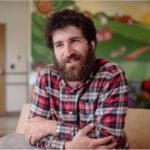 Ariel Pressman is a former organic farmer and current educator with deep experience in wholesale vegetable production and farm viability. He founded and operated Seed to Seed Farm in Wisconsin, where he focused on production for wholesale buyers and built efficient systems to meet the demands of distributors, co-ops and institutions. Ariel later served as director of certification at the Real Organic Project. He also works with the University of Minnesota Extension mentoring farmers on scaling production and navigating wholesale markets. Ariel draws on both his farming and program leadership experience to help producers understand the realities of selling into wholesale markets and strengthen their systems for success.
Ariel Pressman is a former organic farmer and current educator with deep experience in wholesale vegetable production and farm viability. He founded and operated Seed to Seed Farm in Wisconsin, where he focused on production for wholesale buyers and built efficient systems to meet the demands of distributors, co-ops and institutions. Ariel later served as director of certification at the Real Organic Project. He also works with the University of Minnesota Extension mentoring farmers on scaling production and navigating wholesale markets. Ariel draws on both his farming and program leadership experience to help producers understand the realities of selling into wholesale markets and strengthen their systems for success.
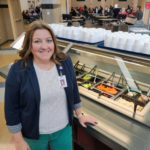 Lisa Stewart is the director of nutrition services at Council Bluffs Community School District, where she oversees meal programs serving 9,000 meals each school day. A registered dietitian and school nutrition specialist, Lisa has led the district’s efforts to provide universal free breakfast and lunch, expand local food purchasing and integrate fresh produce into every school daily. She also champions partnerships with area farmers and classroom nutrition education. Her goal is to make healthy, local food a consistent part of students’ learning and lives.
Lisa Stewart is the director of nutrition services at Council Bluffs Community School District, where she oversees meal programs serving 9,000 meals each school day. A registered dietitian and school nutrition specialist, Lisa has led the district’s efforts to provide universal free breakfast and lunch, expand local food purchasing and integrate fresh produce into every school daily. She also champions partnerships with area farmers and classroom nutrition education. Her goal is to make healthy, local food a consistent part of students’ learning and lives.
 Nancy Eastman is the food service director at Riceville Community School District. She has led the district’s holistic farm-to-school program, creating hands-on opportunities for students to connect with fresh, local food through taste tests, farmer visits and signature events like The Great Apple Crunch, Riceville’s elementary school farmers market and Local Food Day events. Under her leadership, the program has become a model for how schools can build vibrant local food systems. Riceville Community School District is a three-year winner of Iowa’s Healthiest School award. In 2024, Riceville’s efforts were recognized with the Golden Root Award from the Iowa Farm to School and Early Care Coalition.
Nancy Eastman is the food service director at Riceville Community School District. She has led the district’s holistic farm-to-school program, creating hands-on opportunities for students to connect with fresh, local food through taste tests, farmer visits and signature events like The Great Apple Crunch, Riceville’s elementary school farmers market and Local Food Day events. Under her leadership, the program has become a model for how schools can build vibrant local food systems. Riceville Community School District is a three-year winner of Iowa’s Healthiest School award. In 2024, Riceville’s efforts were recognized with the Golden Root Award from the Iowa Farm to School and Early Care Coalition.
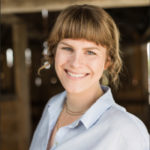 Giselle Bruskewitz is dedicated to strengthening Iowa’s local food system through collaborative, community-driven work. As senior program director at Iowa Valley RC&D, she leads the value chain team and partners on statewide efforts related to value chain coordination, farm-to-school efforts, food access, farmer viability, education and advocacy. Giselle facilitates Iowa’s Food Hub Managers Working Group and serves in key leadership roles, including as vice chair of the Iowa Food System Coalition. She also serves on Iowa Farm to School & Early Care Coalition’s joint procurement strategy team.
Giselle Bruskewitz is dedicated to strengthening Iowa’s local food system through collaborative, community-driven work. As senior program director at Iowa Valley RC&D, she leads the value chain team and partners on statewide efforts related to value chain coordination, farm-to-school efforts, food access, farmer viability, education and advocacy. Giselle facilitates Iowa’s Food Hub Managers Working Group and serves in key leadership roles, including as vice chair of the Iowa Food System Coalition. She also serves on Iowa Farm to School & Early Care Coalition’s joint procurement strategy team.
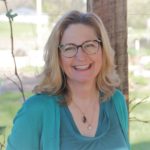 Michelle Dill is the executive director of Farm Table Delivery, a nonprofit food hub that connects local foods to schools, restaurants, retailers and families. Before this role, she dedicated over a decade to empowering small producers, optimizing supply chains and nurturing entrepreneurial food enterprises in both Iowa and Nebraska. Michelle has 25 years of experience in nonprofit executive leadership and fundraising, and is a passionate food systems advocate.
Michelle Dill is the executive director of Farm Table Delivery, a nonprofit food hub that connects local foods to schools, restaurants, retailers and families. Before this role, she dedicated over a decade to empowering small producers, optimizing supply chains and nurturing entrepreneurial food enterprises in both Iowa and Nebraska. Michelle has 25 years of experience in nonprofit executive leadership and fundraising, and is a passionate food systems advocate.
 Stefanie Jaeger has 15-plus years of experience working in food systems in a variety of roles. She started by running a producer cooperative CSA in northern Wisconsin for four years. For the past eight-plus years, she has applied that on-the-ground knowledge to helping farms, hubs and markets all over the U.S. and Canada evaluate and implement technical solutions to their complex problems.
Stefanie Jaeger has 15-plus years of experience working in food systems in a variety of roles. She started by running a producer cooperative CSA in northern Wisconsin for four years. For the past eight-plus years, she has applied that on-the-ground knowledge to helping farms, hubs and markets all over the U.S. and Canada evaluate and implement technical solutions to their complex problems.
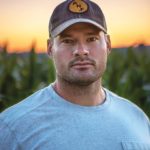 Matt Kroul is a third-generation farmer at Kroul Family Farm in Mount Vernon, Iowa, where he and his family raise vegetables, row crops, and livestock. A former University of Iowa and NFL football player, Matt returned to the farm to continue the family legacy and expand its enterprises. Alongside their farm stand and agritourism ventures, he has built direct relationships with wholesale buyers to move significant volumes of produce without intermediaries. His experience balancing diverse enterprises, scaling vegetable production and maintaining strong buyer communication offers insight for farmers considering wholesale markets.
Matt Kroul is a third-generation farmer at Kroul Family Farm in Mount Vernon, Iowa, where he and his family raise vegetables, row crops, and livestock. A former University of Iowa and NFL football player, Matt returned to the farm to continue the family legacy and expand its enterprises. Alongside their farm stand and agritourism ventures, he has built direct relationships with wholesale buyers to move significant volumes of produce without intermediaries. His experience balancing diverse enterprises, scaling vegetable production and maintaining strong buyer communication offers insight for farmers considering wholesale markets.
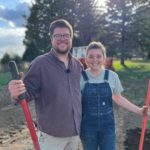 Carly Zierke, co-owner of Sweet Season Farm, grows certified organic vegetables in Calmar, Iowa, serving the Decorah area. She and her partner, Ethan Zierke, use regenerative practices that improve the health of the land. Sweet Season Farm’s mission is working to preserve Iowa’s rich topsoil while contributing to a resilient local food system.
Carly Zierke, co-owner of Sweet Season Farm, grows certified organic vegetables in Calmar, Iowa, serving the Decorah area. She and her partner, Ethan Zierke, use regenerative practices that improve the health of the land. Sweet Season Farm’s mission is working to preserve Iowa’s rich topsoil while contributing to a resilient local food system.
Short Course 2: Field Crops Research Highlights
PFI’s on-farm research program is a cornerstone of the organization that provides a unique opportunity for farmers to explore pressing questions they have on their farms with scientific support from PFI’s own research team. Farmers generate trial ideas, identify what results they’re seeking and complete randomized, replicated trials on their own farms in both single and multiyear trials. This short course will highlight several prominent research projects from the last few years. Together, we’ll take a closer look at the how, the why and the long-term outcomes of completing on-farm research.
Sessions
Session 1: Comparing Strip-Till and No-Till Methods Following a Cover Crop
Speakers: Keaton Krueger, Tim Sieren
Planting using no-till or strip-till methods reduces soil disturbance, thus helping to improve soil health. Some farmers, however, are trying to determine which of the two methods is most effective and profitable on their farms. Keaton Krueger and Tim Sieren have both compared no-till and strip-till methods following cover crops through trials on their own farms and have seen slightly differing results.
Session 2: Panel: Are Biologicals Beneficial? Cooperators Weigh In
Speakers: Robert Harvey, Keaton Krueger
Biologicals can take many forms. For example, they can show up as in-furrow applications, seed treatments and foliar sprays. PFI cooperators have tested the efficacy and return on investment of biological products in several trials over the years. In this session, Robert Harvey and Keaton Krueger will present on the trials they have completed. Attend to learn what work their trials required, what the results were and how the data affected their decisions related to biological inputs.
Session 3: Roller-Crimping Impact on Soybean Yield and Profit
Speaker: Jon Bakehouse
Roller-crimping a cover crop can help you keep soil covered and limit weed pressure while reducing chemical inputs. But the practice isn’t so simple, and efficacy may vary depending on timing and other variables. Jon Bakehouse will discuss his trials assessing the impact of roller-crimp timing on soybean yield and returns. He’ll also share how these trials have informed his management decisions over time.
Session 4: Soybean Maturities in Delayed-Termination Rye
Speaker: Alec Amundson
Alec Amundson participated in and completed a trial where cooperators tested planting later relative-maturity soybeans. They investigated if it can help avoid soybean yield decline when planting green compared to delaying rye termination by more than two weeks. Alec will discuss the reasoning behind this trial idea, the process of completing the trial, findings and how those results impacted the decisions he makes on his farm today.
Session 5: Panel: Can We Reduce N Rates to Corn and Improve ROI?
Speakers: Bailey Scott Hobbs, Jon Bakehouse, Sam Bennett
As concerns grow over nitrate leaching and rising input costs, farmers across the Midwest are exploring how much nitrogen they really need to add to their fields to still ensure a profit. For several years, many PFI cooperators have put their fields to the test through replicated strip trials comparing their typical nitrogen rate with a reduced rate. Hear from Bailey, Jon and Sam about their involvement in the trials, what they’ve learned and how they’re adapting based on the results.
Meet the Speakers
Keaton Krueger farms with his wife, Angela Krueger, near Ogden, Iowa. He has been farming for over eight years and raises corn, soybeans and hogs. Keaton uses strip-till and plants cover crops ahead of corn and soybeans, has worked to reduce his nitrogen rates and is actively involved in PFI’s Cooperators’ Program.
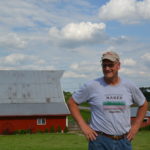 Tim Sieren and his wife, Ethel Sieren, run Green Iron Farms, a diversified crop and livestock family farm raising corn, soybeans, small grains, cattle and hogs near Keota, Iowa. Since joining PFI’s Cooperators’ Program in 2013, Tim has been conducting trials on how to better incorporate cover crops, green manures and small grains into the operation.
Tim Sieren and his wife, Ethel Sieren, run Green Iron Farms, a diversified crop and livestock family farm raising corn, soybeans, small grains, cattle and hogs near Keota, Iowa. Since joining PFI’s Cooperators’ Program in 2013, Tim has been conducting trials on how to better incorporate cover crops, green manures and small grains into the operation.
Lifetime PFI member Robert Harvey owns and operates Sunny Crest Farm with his wife, Ruth Harvey. They raise cattle, corn, soybeans, hay and cover crops on 700 acres near Redfield, Iowa. They were also recipients of the Iowa Farm Environmental Leader Award in 2016.
 Jon Bakehouse farms with his family in southwest Iowa near Hastings. They raise corn and soybeans and love exploring new farming practices through on-farm research.
Jon Bakehouse farms with his family in southwest Iowa near Hastings. They raise corn and soybeans and love exploring new farming practices through on-farm research.
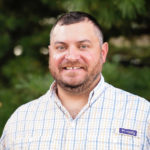 Alec Amundson operates Green Country Farms in Mitchell County, Iowa, where he raises corn, soybeans and rye. The Amundsons use cover crops and no-till and have been relay-cropping since 2018.
Alec Amundson operates Green Country Farms in Mitchell County, Iowa, where he raises corn, soybeans and rye. The Amundsons use cover crops and no-till and have been relay-cropping since 2018.
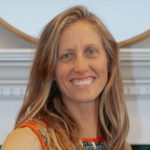 Bailey Scott Hobbs returned to her family farm in Dunnell, Minnesota, in 2021. Since then, she and her husband Mike, along with their three kids, have used prior farming experience and on-farm research to explore crops, farming practices and enterprises beyond the established row crop rotation of corn and soybeans.
Bailey Scott Hobbs returned to her family farm in Dunnell, Minnesota, in 2021. Since then, she and her husband Mike, along with their three kids, have used prior farming experience and on-farm research to explore crops, farming practices and enterprises beyond the established row crop rotation of corn and soybeans.
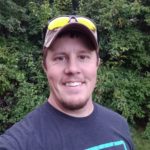 Sam Bennett and his wife, Danielle Bennett, raise corn, soybeans and small grains with Sam’s family on a 2,000-acre operation in Galva, Iowa. They use cover crops, no-till and strip-till to work toward their goals of improving soil health, conservation, nutrient management, water quality and creating habitat.
Sam Bennett and his wife, Danielle Bennett, raise corn, soybeans and small grains with Sam’s family on a 2,000-acre operation in Galva, Iowa. They use cover crops, no-till and strip-till to work toward their goals of improving soil health, conservation, nutrient management, water quality and creating habitat.
Short Course 3: Poultry Pathways: The Business of Raising Birds for Meat and Eggs
Poultry is not the main business on many farms. But whether it’s a side enterprise or the focus, it’s worth knowing how to care for your birds. It’s also important that the birds work for you. This short course is designed to cover the spectrum from egg production to meat birds. You’ll learn about some universal aspects of poultry farming, like biosecurity and necropsies, as well as business management and fair pricing. Come hear from farmers and experts how they make a living in the world of birds – and how you can too.
Sessions
Session 1: Processing Meat Birds: Scaling Up From on the Farm
Speaker: Jason Grimm
Exciting new poultry processing ventures are taking place right here in Iowa. Jason Grimm started with processing his own chickens on the farm in converted buildings in 2015. Since 2021, he has been able to process his own chickens using a custom poultry license under the Iowa Department of Agriculture and Land Stewardship in a converted building on family land. In 2025, Jason and his family finished constructing a new facility on their own farm. Grimm Family Farm will continue processing their own poultry and offer processing services to others farms as well. Come learn how Jason has scaled up to meet the demand he sees, and the logistics it takes to create a poultry processing plant.
Session 2: A Poultry Business by the Numbers
Speaker: Ben Grimes
Have you ever wanted to look through the financials of another farm? Seeing how others organize their spreadsheets and manage their paperwork can help you get new ideas – or just reaffirm how you do things. Join Ben as he digs deep into spreadsheets, data tracking and how he’s using the numbers to make decisions on his poultry farm.
Session 3: Pricing Pastured Poultry
Speaker: Ben Grimes
Between producing a great product and marketing it to customers, there is a crucial step: setting the price. This number represents all the time, work and money you put into raising your bird. Deciding on an equitable value for all of that – while remaining accessible to customers – can be daunting. Learn from Ben Grimes of Dawnbreaker Farms as he discusses the practicalities and considerations of pricing.
Session 4: Stories and Lessons Learned From 10 Years of Egg Production
Speaker: Arlyn Kauffman
It’s not that hard to get chickens to lay eggs, but optimizing their production and livability does take some curiosity and attention to detail. Learn from Arlyn as he shares stories and tips from his experience in chicken husbandry. You’ll hear about formulating nutrition, biosecurity, pasture health, winter lighting and more.
Session 5: Diagnosing Poultry With a Necropsy
Speaker: Dr. Mohamed El-Gazzar
Unfortunately, some poultry will die prematurely. Sometimes the cause is obvious, like predation. But other times, the cause of death is not as clear. In those cases, it’s useful to be able to investigate and diagnose the situation so that more deaths can be prevented in the future. In this session, poultry diagnostician Dr. Mohamed El-Gazzar will explain how to do a basic necropsy and what to look for as red flags in your birds. He’ll cover basic necropsy techniques and sample collection, as well as basic interpretation of normal versus abnormal tissues.
Meet the Speakers
 Jason Grimm owns Grimm Family Farm near Williamsburg, Iowa. The family produces dry beans, potatoes and pastured poultry that are marketed to restaurants, grocers, school districts, food hubs and directly to consumers. Jason has extensive experience with on-farm poultry processing and has recently built a new plant to accept poultry from other farms. When Jason isn’t on the farm, he is the executive director for Iowa Valley RC&D, leveraging over 16 years of experience working in Iowa with local, state and national partners.
Jason Grimm owns Grimm Family Farm near Williamsburg, Iowa. The family produces dry beans, potatoes and pastured poultry that are marketed to restaurants, grocers, school districts, food hubs and directly to consumers. Jason has extensive experience with on-farm poultry processing and has recently built a new plant to accept poultry from other farms. When Jason isn’t on the farm, he is the executive director for Iowa Valley RC&D, leveraging over 16 years of experience working in Iowa with local, state and national partners.
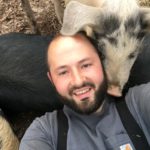 Farmer Ben Grimes of North Carolina has been in the pastured poultry business since 2013 on his farm, Dawnbreaker Farms. Since then, he has raised, processed and sold 50,000 birds through retail and wholesale channels. In 2020 he started Carolina Pastures, a collective of local pasture-based meat farmers, to scale and aggregate products to make a larger impact on the food system.
Farmer Ben Grimes of North Carolina has been in the pastured poultry business since 2013 on his farm, Dawnbreaker Farms. Since then, he has raised, processed and sold 50,000 birds through retail and wholesale channels. In 2020 he started Carolina Pastures, a collective of local pasture-based meat farmers, to scale and aggregate products to make a larger impact on the food system.
 Arlyn Kauffman owns and operates Green Ridge Family Farm near Weldon, Iowa, with his wife, Sue, and their five children. The operation started with square hay bales in 2008 and today includes laying hens, a small cattle herd, corn, soybeans, alfalfa, rye, oats and wheat.
Arlyn Kauffman owns and operates Green Ridge Family Farm near Weldon, Iowa, with his wife, Sue, and their five children. The operation started with square hay bales in 2008 and today includes laying hens, a small cattle herd, corn, soybeans, alfalfa, rye, oats and wheat.
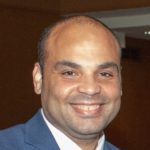 Dr. Mohamed El-Gazzar is an associate professor and a poultry diagnostician at Iowa State University’s Veterinary Diagnostic Laboratory. He provides diagnostic services to the poultry industry with a research program focused on developing and validating molecular diagnostics to identify and characterize poultry pathogens. The goal of Mohamed’s work is to prevent, control and eradicate infectious disease in poultry.
Dr. Mohamed El-Gazzar is an associate professor and a poultry diagnostician at Iowa State University’s Veterinary Diagnostic Laboratory. He provides diagnostic services to the poultry industry with a research program focused on developing and validating molecular diagnostics to identify and characterize poultry pathogens. The goal of Mohamed’s work is to prevent, control and eradicate infectious disease in poultry.
Short Course 4: Farm Transition: Taxes and Estate Planning
Join Kristiana Coutu in this step-by-step workshop to get you closer to your farm transition goals. She’ll walk us through the tax implications of your farm transition and discuss estate planning tools and when to use them. She’ll also discuss the importance of having business succession goals to set up the next generation with success. As a bonus, you’ll get to hear land transition stories from two farmers invested in crafting a farm transition to benefit the next generation of farmers.
Sessions
Session 1: Meeting Each Other and Thinking About Farm Transition
Speaker: Martha McFarland
Farm transition requires foresight, hard work and patience. In this session, you’ll reflect on your farm’s past, your current operation and the reasons why you’re taking steps now to plan out the future of your farm. You’ll start to identify the gaps in knowledge you might have when it comes to transition tools and resources – and you’ll leave with a good primer for the session to come.
Session 2: The Current and Future Transfer Tax Environment
Speakers: Terri Mork Speirs, Kristiana Coutu
Join Kristiana in this session to learn about navigating federal gift, estate and generation-skipping transfer tax. She will help you understand the changes made to transfer tax laws under the “big beautiful” bill and how you can prepare for changes that affect your farm and loved ones.
Session 3: Advanced Estate Planning Tools
Speaker: Terri Mork Speirs, Kristiana Coutu
Get a sense of your general goals when it comes to estate planning in this session. You’ll hear an overview from Kristiana Coutu on advanced estate planning tools, including range of trusts, business entities and charitable options. Kristiana will break down the mechanics of each tool and help you understand which tool to use, and when.
Session 4: Preserving the Farm
Speakers: Angela Tedesco, Beth Hoffman
Deciding how and when to transition your farm can be a lengthy and emotionally layered endeavor with stakeholders, families and your community to consider. Hear Beth Hoffman and Angela Tedesco tell two different farmland transition stories and how their choices and familial relationships changed their farmland’s trajectory.
Session 5: Crafting Your Business Succession Goals
Speakers: Terri Mork Speirs, Kristiana Coutu
Why does your business succession matter? Find out as Kristiana Coutu walks us through common goals she sees with her farmers. She’ll discuss how to structure your farm operation to ensure smooth management transfer and what silent partners and nonvoting units can look like. She’ll also discuss building an advisory team that can guide you through this major life transition in a way that’s aligned with your goals for the farm and your family.
Meet the Speakers
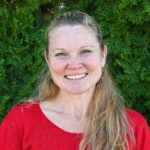 Martha McFarland is the farmland viability coordinator at PFI. In this role, she supports members through farm transition coaching and mediation, helps beginning farmers seeking land and fosters tenant-landowner connections. She has a master’s degree in education from Colorado State University.
Martha McFarland is the farmland viability coordinator at PFI. In this role, she supports members through farm transition coaching and mediation, helps beginning farmers seeking land and fosters tenant-landowner connections. She has a master’s degree in education from Colorado State University.
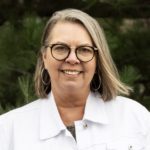 Terri Mork Speirs has been working in development and communications supporting nonprofits across sectors for her entire career. She joined the PFI staff in 2025 as the director of development, where she is excited to steward and grow Practical Farmers’ donor base.
Terri Mork Speirs has been working in development and communications supporting nonprofits across sectors for her entire career. She joined the PFI staff in 2025 as the director of development, where she is excited to steward and grow Practical Farmers’ donor base.
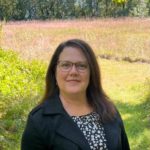 Kristiana Coutu is a farmer, a certified public accountant and an attorney. She is the director of the Beginning Farmer Center and counsel for the Center for Agricultural Law and Taxation at Iowa State University. Kristiana provides educational resources and programming for farmers and their professional advisors.
Kristiana Coutu is a farmer, a certified public accountant and an attorney. She is the director of the Beginning Farmer Center and counsel for the Center for Agricultural Law and Taxation at Iowa State University. Kristiana provides educational resources and programming for farmers and their professional advisors.
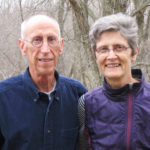 Angela Tedesco owned and operated Turtle Farm near Granger, Iowa, for 17 years. She started one of the first vegetable CSAs in Iowa, and is a former PFI board member, past recipient of PFI’s Farmland Owner Legacy Award and author of the book “Finding Turtle Farm.”
Angela Tedesco owned and operated Turtle Farm near Granger, Iowa, for 17 years. She started one of the first vegetable CSAs in Iowa, and is a former PFI board member, past recipient of PFI’s Farmland Owner Legacy Award and author of the book “Finding Turtle Farm.”
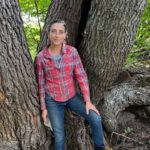 Beth Hoffman has written for NPR, The Guardian and Civil Eats, among others, and authored the book “Bet the Farm: The Dollars and Sense of Growing Food in America.” She lives and farms with her husband, John Hogeland, at Whippoorwill Creek Farm outside of Lovilia, Iowa.
Beth Hoffman has written for NPR, The Guardian and Civil Eats, among others, and authored the book “Bet the Farm: The Dollars and Sense of Growing Food in America.” She lives and farms with her husband, John Hogeland, at Whippoorwill Creek Farm outside of Lovilia, Iowa.

